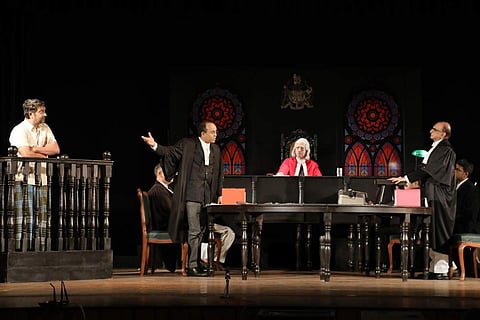Who killed Lakshmikanthan?
In 2016, The Madras Players were asked to do a dramatised representation in the Madras High Court of a ceremony of 1872, which was the ceremonial handing over of the key by the British to the Indians. The entire legal fraternity was there; about 3,000 people attended it. At that time, the Senior Advocate of Chennai said, ‘Why don’t The Madras Players celebrate what is probably the most famous criminal trial of the Madras High Court?’ The Lakshmikanthan murder case, involving some of the biggest names of the Tamil cinema industry, like actors M K Thyagaraja Bhagavathar and N S Krishnan, and director S M Sriramulu Naidu.
“I agreed to do the play, if the original trial transcripts of 1945 were made available by the High Court,” writer and director of the play Lakshmikanthan, P C Ramakrishna tells us, adding, “So, they checked their archives and produced the original paper relating to the trial — some 200 pages!”
Along with a historian friend, who had written various essays regarding the character of C N Lakshmikanthan, an infamous film journalist, Ramakrishna while researching found out “how vile a fellow Lakshmikanthan actually was”. “He blackmailed everybody to run a magazine called Cinema Thoothu and later Hindu Nesan, where he wrote all kinds of bedroom secrets. Whether it was a politician, or a public figure, or an editor of a newspaper — he spared no one. People paid him to buy his silence, which only meant he was so hated that there’s no doubt many people wanted to get him killed. But who actually did it remains a mystery,” says Ramakrishna.
Lakshmikanthan, the play, was first staged last year though it was ready just before COVID brought our lives to a halt. Ultimately, when it was staged, “it took Madras by storm!” says the director, who also informs us that he hasn’t changed anything from the transcripts. “The only addition I have made is an element of discussion, a play within a play — by way of having four present day lawyers look into this case as it happens, and offer commentary on the case as it goes on,” which he believes will not only help audience keep track of what’s happening but also stay engaged.
Of course, including all of what is in the transcripts wasn’t possible for a stage presentation, so Ramakrishna chose some of the witnesses, those that made a difference to the case. Based on the witnesses’ confession, the jury pronounced those found guilty — Bhagavathar and Krishnan, who spent 27 months behind bars before they were acquitted.
What the director finds strange though is that such a big murder case was never made into a movie, or a theatre play before The Madras Players took it up. “Maybe because no one wanted to open a Pandora’s box,” he says, adding, “I’ve also chosen only those who are probably dead and gone and whose names even if mentioned doesn’t make too much of a ripple to today’s audience.”
Interestingly, in the play, at least four to five actors are practising lawyers in the Madras High Court. Out of them, however, only one plays a lawyer; the others play witnesses.
The titular role is being played by D Ramachandran, a seasoned actor. N L Rajah, a senior lawyer of the Madras High Court, plays Defence Counsel K M Munshi; and Shantaram, also a seasoned actor, plays the Prosecuting Counsel, Advocate General P V Rajamannar. Michael Caves is playing the English judge, Justice Vere Mockett.
Ramakrishna says, “This courtroom is preserved in the Madras High Court, all, of course, in rosewood and mahogany. We went there, took a photograph, and our sets artiste, Victor Paul Raj, created the courtroom — the jury box, the witness stand and the judges bench — from cheap wood. And as soon as curtain opens to that particular dramatic court scene, the audience invariably goes into an applause.”
So, how does the play end, we ask: “Please come and watch?” the director replies.
Rs 499 & Rs 799.
August 12,7 pm.
At Music Academy
Main Hall, TTK Road.
rupam@newindianexpress.com
@rupsjain

